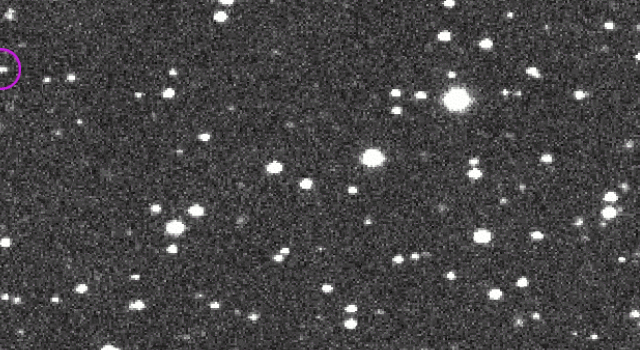
This animated GIF shows Asteroid 2014 AA, discovered by the NASA-sponsored Catalina Sky Survey on Jan. 1, 2014, as it moved across the sky. (CSS/LPL/UA)
As Americans were ringing in 2014 early Wednesday morning, scientists caught sight of what appeared to be a very small asteroid – between 2 and 3 meters in size – on a potential impact trajectory with Earth.
The observation was made at the Catalina Sky Survey near Tucson, Arizona. The space rock, designated 2014 AA, may have been the first asteroid discovery of the New Year. If the space object was an asteroid, scientists, using the scant observational data that was available to them, suggest that it probably entered Earth’s atmosphere sometime between 2 p.m. EST, Wednesday, Jan. 1 and 9 a.m. EST Thursday, Jan. 2.
Three independent projections of the space object’s possible orbit were made by Bill Gray, of the Minor Planet Center in Cambridge, Massachusetts, and Steve Chesley from NASA’s Near Earth Object Program at the Jet Propulsion Laboratory in Pasadena, California. The two scientists agree that 2014 AA probably pushed its way into Earth’s atmosphere.

Using data produced by weak signals from three infrasound detections, the crisscrossing of the white lines in this image indicates possible impact points of asteroid 2014 AA (Peter Brown/University of Western Ontario)
Because of the uncertainty of the object’s orbit, 2014 AA could have fallen anywhere along an arc that extends from Central America to East Africa.
The scientists think that the object may have impacted Earth at 9 PM EST on Jan. 1, just off the coast of West Africa.
NASA said that since another asteroid, 2008 TC3, which was also between 2 to 3 meters in size, completely broke up in October 2008 as it passed over northern Sudan, it’s doubtful that asteroid 2014 AA would have made it through its rough atmospheric entry intact.
Asteroid 2008 TC3, according to NASA, was the only other example of an incoming celestial object that was discovered just prior to hitting Earth.
The scientists are continuing their research into the fate of 2014 AA. They will be analyzing data generated by a few weak signals collected from infrasound – low frequency – monitoring stations located along the predicted impact arc to see if they could be connected to the atmospheric entry of 2014 AA.





















I hope the guys doing this work and others get to the point where they can say more than “Duck!” and prevent a catastrophe if need be. Then mankind will be able to say again, thank God, for science and technology.
I speculate that it is possible to aim some ICBM missiles toward space rather than at other nations, since the impact of a large asteroid could strike anywhere without political discrimination.